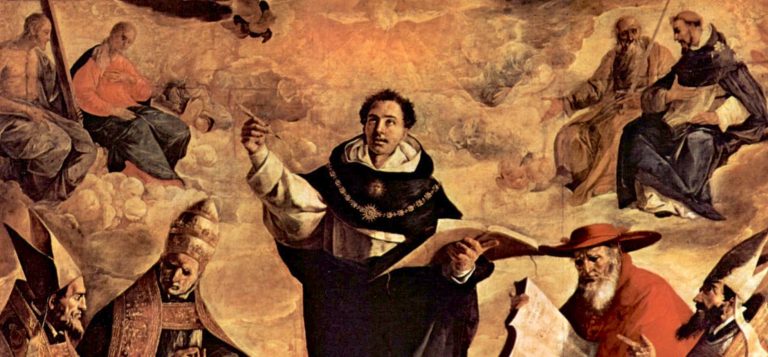By Randall B. Smith

There have been some partisans in the past who have claimed that theologians in the Middle Ages like Thomas Aquinas were not “biblical” or that they did not take the Bible seriously enough. I take it that such claims have not survived critical scrutiny and were effectively refuted long ago to such a degree that there’s really no point arguing the point, any more than there would be any point in arguing whether Thomas Aquinas was a Dominican. But what does it mean to say that Aquinas was a biblical theologian?
Aquinas had the benefit of an unmatched education in philosophy and the arts of dialectic, and he was blessed to live in a culture that was thoroughly Christian in many respects, including much of its most important art, literature, and music, and to have congregations who were, in their own way, often deeply pious. By the same token, he also does not seem to have had congregations willing to stand for long orations or who cared much for fancy rhetorical flourishes. They were also mostly illiterate, so whatever they knew of the Bible and of its teachings they were going to have to get from listening, and they were going to have to retain it in memory.
Indeed an issue which certainly merits more discussion is the relationship between the challenges inherent in instructing a largely illiterate society and the “arts of memory” such as those described in Mary Carruthers’s book The Book of Memory: A Study of Memory in Medieval Culture. We might re-state the question this way: What was the relationship between the “memory arts” and the largely “oral culture” of the Middle Ages?
In the modern world, “illiterate” often implies a lack of knowledge of key texts. Such has not always been the case, however. There are many “oral cultures” where plain persons who cannot read might still be expected to have memorized a great number of what we would call “texts.” I am told that Ireland in the early part of the twentieth century was such a culture, where even those who could not read had memorized a large number of poems, song lyrics, and passages from Scripture. Homer’s culture was another such fundamentally “oral” culture in which the vehicle of “literacy” was not reading written texts, but memorizing oral recitations.
Thus even when Thomas was preaching to Dominican and Franciscan students at the University of Paris, he would have been preaching to those who were expected to go out and preach to a largely illiterate populace. Thomas was always aware of the fact that he was teaching future teachers: those who would be going out to preach and teach the Word of God to lay people in the churches. As he was always aware that he was teaching future teachers, so too he was aware that he preaching to future preachers—preachers who would be preaching to a populace that, although they might not have had the ability to read, might still have been expected to have committed to memory (if only by repeated hearing at the Mass) significant portions of the Scriptures. Perhaps we could say of such people that although they were “illiterate” (unable to read), they were not for that reason “unliterary” (unacquainted with important texts).
Some readers will probably still not find Thomas’s sermons “to their taste,” but I hope they might at least gain some admiration for what these medieval preachers were able to accomplish within the forms that had become customary in their day, in the same way that some people who may not quite like what they consider to be the “stodginess” or “overly formal” character of the “Classical” period in music (as opposed to say the Baroque or the Romantic) could still admire the power and beauty a composer such as Mozart was able to achieve.
Randall B. Smith is a professor of theology at the University of St. Thomas in Houston, Texas. He is the author of Reading the Sermons of Thomas Aquinas: A Beginner’s Guide.